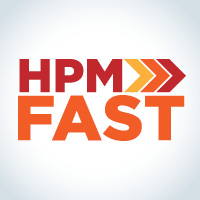HPM FAST™

This study tool is ideal for preparing for the HPM board certification exam or for independent study to assess your knowledge in key topic areas. HPM FAST (Hospice and Palliative Medicine Focused Assessment and Study Tool) modules are quick, effective, targeted educational tools to enhance your clinical practice. Each module includes 25 multiple-choice practice test questions to assess and focus your studies.
HPM FAST Modules
There are four different topic areas featured in the HPM FAST products.
Pediatrics, 3rd Edition
This HPM FAST module includes care of pediatric and adolescent patients and developmentally appropriate care.
Prognostication, 3rd Edition
This HPM FAST module includes disease-specific prognostication, communication, and the impact of mechanical interventions.
Psychiatry and Cognition, 3rd Edition
This HPM FAST module includes mental illness, delirium, and decision-making ability.
Hospice Regulatory, 2nd Edition
This product will be expiring November 4, 2022.
This HPM FAST module includes key components of the Hospice Medicare Benefit (HMD), Conditions of Participation, services of Interdisciplinary Group (IDG), and important components of Medicare payment and billing for hospice services.
Access to HPM FAST
You can access HPM FAST modules an unlimited number of times.
Each module includes explanations for the correct and incorrect answers and up-to-date references to provide guidance for further study.
View the CME and MOC credits for each product.
How You Will Benefit
- Focus your study on key topics: prognostication, pediatrics, psychiatry and cognition, and hospice regulatory.
- Discover areas where you will benefit from further study.
- Gain insight into correct and incorrect answers along with current references.
Sample Question - HPM FAST Psychiatry and Cognition
A 65-year-old man with advanced congestive heart failure has been admitted for the past 3 days with a constant cough productive with copious amounts of non-bloody mucoid sputum and several episodes of post-tussive emesis during the day. A chest x-ray was normal. The patient is awake and oriented. His daughter, who is his primary caregiver, notes the high level of distress and disruption particularly associated with his gurgling and congestion and asks if anything can be done to help decrease his sputum. Prior to this admission, his daughter assisted the patient with meal preparation and other physically demanding tasks, but the patient managed his own finances and maintained regular phone communication with friends and family. He is discharged home with hospice with a scopolamine patch and 3 days of antibiotics to complete a 7-day empiric course. The hospice nurse visiting him at home the next day notes that the patient is more comfortable with an adequate decrease in secretions. However, his daughter notes that he is no longer oriented to place or time and is having difficulty recognizing visiting family and friends. A physical exam reveals stable vital signs with known murmur of aortic stenosis, mydriasis, normal air movement and bowel sounds, and no focal motor or sensory neurologic deficits.
Which is the most likely explanation for his change in mental status?
- Undetected cognitive impairment associated with dementia.
- Acute delirium associated with a scopolamine patch.
- Adverse reaction to empiric antibiotic.
- Neurologic symptoms related to a systemic infection.
The correct answer is B, acute delirium associated with a scopolamine patch. The patient is most likely experiencing toxicity from anticholinergic effects of scopolamine. The acute onset of his symptoms over a few days are suggestive of a recent clinical event such as an addition of a medication (in this case scopolamine or in other scenarios, atropine, or glycopyrrolate). Of note, glycopyrrolate does not cross the blood/brain barrier and consequently may be preferred for the management of increased secretions.
Option A, undetected cognitive impairment associated with dementia, is incorrect. The patient’s history does not suggest that he had symptomatic cognitive impairment at baseline to which these newly documented deficits can be attributed, given that he had managed his own finances.
Option C, adverse reaction to empiric antibiotic, is incorrect. Adverse reaction to an antibiotic can also be considered; however, the patient has received this drug for 3 days prior to discharge without any immediate reactions, making a drug-related allergy less likely.
Option D, neurologic symptoms related to a systemic infection, is incorrect. A systemic infection presenting with non-traditional symptoms is always of concern, particularly among older adults, but does not account for this patient’s mydriasis; occult infection is a reasonable differential to pursue after ruling out anticholinergic toxicity.
Take-Home Point
Anticholinergic medications have an important role in the management of increased secretions and nausea, particularly near the end of life. The clinician must be vigilant for signs of anticholinergic toxicity, particularly in the older adult population.
References
Patel PN1, Ezzo DC. Withdrawal symptoms after discontinuation of transdermal scopolamine therapy: treatment with meclizine. Am J Health Syst Pharm. 2009 Nov 15;66(22):2024-6. doi: 10.2146/ajhp080569.
http://www.ajhp.org/content/66/22/2024?sso-checked=true
